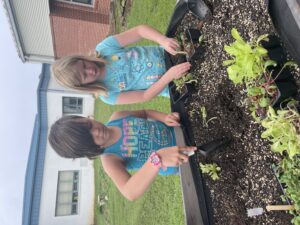Youth Learn to Grow Their Own Food
go.ncsu.edu/readext?753190
en Español / em Português
El inglés es el idioma de control de esta página. En la medida en que haya algún conflicto entre la traducción al inglés y la traducción, el inglés prevalece.
Al hacer clic en el enlace de traducción se activa un servicio de traducción gratuito para convertir la página al español. Al igual que con cualquier traducción por Internet, la conversión no es sensible al contexto y puede que no traduzca el texto en su significado original. NC State Extension no garantiza la exactitud del texto traducido. Por favor, tenga en cuenta que algunas aplicaciones y/o servicios pueden no funcionar como se espera cuando se traducen.
Português
Inglês é o idioma de controle desta página. Na medida que haja algum conflito entre o texto original em Inglês e a tradução, o Inglês prevalece.
Ao clicar no link de tradução, um serviço gratuito de tradução será ativado para converter a página para o Português. Como em qualquer tradução pela internet, a conversão não é sensivel ao contexto e pode não ocorrer a tradução para o significado orginal. O serviço de Extensão da Carolina do Norte (NC State Extension) não garante a exatidão do texto traduzido. Por favor, observe que algumas funções ou serviços podem não funcionar como esperado após a tradução.
English
English is the controlling language of this page. To the extent there is any conflict between the English text and the translation, English controls.
Clicking on the translation link activates a free translation service to convert the page to Spanish. As with any Internet translation, the conversion is not context-sensitive and may not translate the text to its original meaning. NC State Extension does not guarantee the accuracy of the translated text. Please note that some applications and/or services may not function as expected when translated.
Collapse ▲Madison County is a rural community where many citizens face hunger and issues with food accessibility. Many children are several generations removed from the farm, and fewer families keep a garden, therefore more children are growing up without the knowledge or skills to grow their own food.
Madison County 4-H is responding to food insecurity and the need for gardening education by providing 4-H Soil Solutions School Enrichment to 3rd-grade classes. Students learn about soil properties, plant growth, and sustainability. Most importantly, youth learn where food comes from and how to grow a garden to produce their own food. The ability to grow a garden is a life skill that may help children and their families become more food secure at home.
One hundred eighty-eight students in every 3rd-grade class at Brush Creek, Mars Hill, and Hot Springs Elementary Schools participate in 4-H Soil Solutions annually. Madison County 4-H provides educational supplies to teachers, so students can have hands-on learning experiences in their classrooms and school gardens. Students learned about soils, plant growth, and pollinators as they planted and harvested cool-season gardens at their schools.
Teachers, serving as 4-H volunteers, administered pre- and post-tests on knowledge and experience evaluations. On average, post-test scores were 70% better than pre-test scores. Test results indicate an increase in knowledge of soil properties, pollination, and plant growth. Many children had never grown their own food before, therefore learning a valuable life skill that they can use now and in the future.
In response to the question, How have soils been important in your life, students wrote (direct quotes, with spelling corrected):
- I plant and eat the veggies / Because that’s how you plant food
- It makes food for us / They give us food / They provide food
- Gardening / To grow food, plants, flowers
- They’ve helped me make money
- Soils have been good to me by letting me put my toys in the mud




